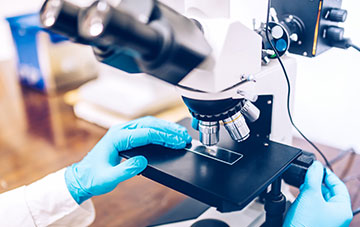Biotechnology Program
- Home
- Ras Sudr
- Field of Basic Sciences
- Biotechnology Program

Bachelor’s Degree Biotechnology
Program Details
| Courses: 52 Courses | Duration: 8 Semesters | Language: English |
| Seats: 100 Seats (47 Rsvd) | Credit Hours: 132 Cr. Hrs. | Program: Biotechnology |
Program Description
Molecular biotechnology is the use of laboratory techniques to study and modify nucleic acids and proteins for applications in areas such as human and animal health, agriculture, and the environment. Molecular biotechnology results from the convergence of many areas of research, such as molecular biology, microbiology, biochemistry, immunology, genetics, and cell biology. The tools of molecular biotechnology can be applied to develop and improve drugs, vaccines, therapies and diagnostic tests that will improve human and animal health. Molecular biotechnology has applications in plant and animal agriculture, aquaculture, chemical and textile manufacturing, forestry, and food processing. Every aspect of our lives in the coming decades will be affected by this dynamic field.
Program Advantages
While technology generally aims to create tools to empower man, biotechnology aims to change man himself, to better fit him into the world. Simply put, biotechnology is the application of advances made in the biological sciences, especially involving the science of genetics and its application. Biotechnology has helped improve food quality, quantity and processing. It also has applications in manufacturing, where simple cells and proteins can be manipulated to produce chemicals. But biotechnology is most important for its implications in health and medicine.
Graduate Attributes

- Transfer and apply core scientific concepts to propose solutions in the Biotechnology industry.
- Work in ways that are informed by knowledge of the legislative, regulative, commercial, scientific and social environment.
- Use critical analysis and problem-solving skills to propose innovative solutions within a diverse range of biotechnology industry sectors.
- Synthesize information and effectively, succinctly and sensitively communicate with the scientific community, co-workers, government agencies, investors, broad public and particular cultural and Indigenous communities.
- Apply judgment and initiative to propose and prioritize work strategies in consultation with co-workers to achieve timely completion of a project.
- Work in a multidisciplinary team and incorporate the views of all stakeholders including Indigenous groups.
- Use self-awareness and consultation to understand their role within a group and how they can best contribute to the group.
- Articulate a conscious understanding of their own values and demonstrate respect for the values of others and the ability to view an ethical dilemma from multiple viewpoints.
- Inform society of impending developments and engage in a constructive debate.
Job Opportunities
- Research centres
- Pharmaceutical and vaccines companies
- Companies responsible for the development of agriculture and water purification
- Industrial companies producing chemicals, proteins, fibres and vitamins.
- Food inspection agencies
- Manufacture of biopharmaceuticals
- Genetic testing services
- Medical Laboratories
Getting started
-
Semester 1
6 Courses
Code Course Name LCT LAB TUT OTH CNTCT CH SWL ECTS GES111 Physical Geology 2 2 0 0 4 3 150 6 BIO131 Biology I 2 2 0 0 4 3 150 6 CHE111 Organic Chemistry 2 2 0 0 4 3 150 6 PHY111 Physics I 2 2 0 0 4 3 150 6 MAT111 Mathematics I 3 1 0 0 4 3 150 6 UC1 University Requirement (1) 2 0 0 0 2 2 90 4 -
Semester 2
7 Courses
Code Course Name LCT LAB TUT OTH CNTCT CH SWL ECTS BIO119 Laboratory Safety and good laboratory practice 1 2 0 0 3 2 105 4 CHE141 Physical Chemistry 2 2 0 0 4 3 150 6 MAT112 Mathematics II 2 2 0 0 4 3 150 6 MAT131 Statistics 1 2 0 0 3 2 105 4 E1 Elective Course (1) 2 2 0 0 4 3 150 6 UC2 University Requirement (2) 2 0 0 0 2 2 90 4 UC3 University Requirement (3) 2 0 0 0 2 2 90 4 -
Semester 3
6 Courses
Code Course Name LCT LAB TUT OTH CNTCT CH SWL ECTS BIO241 Biology II 2 2 0 0 4 3 150 6 CHE221 Inorganic Chemistry 2 2 0 0 4 3 150 6 PHY211 Physics II 2 2 0 0 4 3 150 6 UC4 University Requirement (4) 2 0 0 0 2 2 90 4 UC5 University Requirement (5) 2 0 0 0 2 2 90 4 UE1 Elective University (1) 2 0 0 0 2 2 90 4 -
Semester 4
7 Courses
Code Course Name LCT LAB TUT OTH CNTCT CH SWL ECTS CSE014 Computer Programming and Computational Techniques 2 2 0 0 4 3 150 6 BIO311 Introduction to biotechnology 2 2 0 0 4 3 150 6 E1 Elective Course (1) 2 2 0 0 4 3 150 6 E1 Elective Course (1) 1 2 0 0 3 2 105 4 E1 Elective Course (1) 1 2 0 0 3 2 105 4 UC6 University Requirement (6) 2 0 0 0 2 2 90 4 UE2 Elective University (2) 2 0 0 0 2 2 90 4 -
Semester 5
7 Courses
Code Course Name LCT LAB TUT OTH CNTCT CH SWL ECTS BIO313 Bioinformatics 2 2 0 0 4 3 150 6 BIO321 Molecular Biology I 2 2 0 0 4 3 150 6 BIO322 Microbial biotechnology 1 2 0 0 3 2 105 4 E1 Elective Course (1) 1 2 0 0 3 2 105 4 E2 Elective Course (2) 1 2 0 0 3 2 105 4 E2 Elective Course (2) 2 2 0 0 4 3 150 6 UC7 University Requirement (7) 2 0 0 0 2 2 90 4 - Semester 6
7 Courses
Code Course Name LCT LAB TUT OTH CNTCT CH SWL ECTS BIO312 Molecular Biology II 2 2 0 0 4 3 150 6 BIO341 Plant biotechnology 1 2 0 0 3 2 105 4 ENV311 Environmental biotechnology 1 2 0 0 3 2 105 4 E2 Elective Course (2) 1 2 0 0 3 2 105 4 E2 Elective Course (2) 1 2 0 0 3 2 105 4 E2 Elective Course (2) 2 2 0 0 4 3 150 6 UE3 Elective University (3) 2 0 0 0 2 2 90 4 -
Semester 7
6 Courses
Code Course Name LCT LAB TUT OTH CNTCT CH SWL ECTS BIO411 Molecular genetics 2 2 0 0 4 3 150 6 BIO412 Genetic engineering 2 2 0 0 4 3 150 6 BIO413 Molecular immunology 2 2 0 0 4 3 150 6 BIO414 Stem cell biology 1 2 0 0 3 2 105 4 BIO415 Computational biochemistry 1 2 0 0 3 2 105 4 BIO418 Practical Training and Internship 2 4 0 0 6 4 210 8 -
Semester 8
6 Courses
Code Course Name LCT LAB TUT OTH CNTCT CH SWL ECTS BIO416 Nano-Biotechnology 2 2 0 0 4 3 150 6 BIO419 Graduation Project 2 4 0 0 6 4 210 8 BIO421 Recombinant DNA technology 2 2 0 0 4 3 150 6 BIO422 Industrial biotechnology 1 2 0 0 3 2 105 4 BIO423 Cell culture principles and techniques 1 2 0 0 3 2 105 4 BIO431 Animal biotechnology 1 2 0 0 3 2 105 4

Prof. Reham Hassan Gomaa
Professor reham.hassan@ksiu.edu.eg
Emad Hamdi
Assistant Professor emad.elbilawy@ksiu.edu.egDr. Shehab Ismail Mohamed Ali
Assistant Professor ahmed.ismaeel@ksiu.edu.egDr. Ahmed Mostafa Ismaeel
Assistant Professor shehab.ali@Ksiu.edu.eg
Walaa Mohammed Abd El-Fatah
Assistant lecturer walaa.mohammed@ksiu.edu.eg
Islam Mamdouh Ibrahim
Teaching Assistant islam.elhadad@ksiu.edu.egFAQs
Molecular biotechnology is the use of laboratory techniques to study and modify nucleic acids and proteins for applications in areas such as human and animal health, agriculture, and environment. Molecular biotechnology results from the convergence of many areas of research, such as molecular biology, microbiology, biochemistry, immunology, genetics, and cell biology. The tools of molecular biotechnology can be applied to develop and improve drugs, vaccines, therapies and diagnostic tests that will improve human and animal health. Molecular biotechnology has applications in plant and animal agriculture, aquaculture, chemical and textile manufacturing, forestry, and food processing. Every aspect of our lives in the coming decades will be affected by this dynamic field.
Related Courses
The Petroleum Chemistry program is designed to prepare graduates with the sound theoretical and practical knowledge required for the development of the petroleum and petrochemical sector.
- 08 Semesters
- 132 Cr. Hrs.
Marine biology is one of the most comprehensive programs. It the study of the world’s aquatic organisms and the ecosystems they inhabit.
- 08 Semesters
- 132 Cr. Hrs.
Latest Blog
-

Translation and Simultaneous Interpreting in German students Earn 5 DAAD Scholarships
Apr 18, 2024 -

King Salman International University announces Bid No. (2) for the year 2024, with closed envelopes, to rent a space to work in a pharmacy activity
Apr 18, 2024 -

Bid No. (1) for the year 2024, with closed envelopes, to rent a space to work as a medical analysis laboratory for a one-day hospital
Apr 18, 2024

